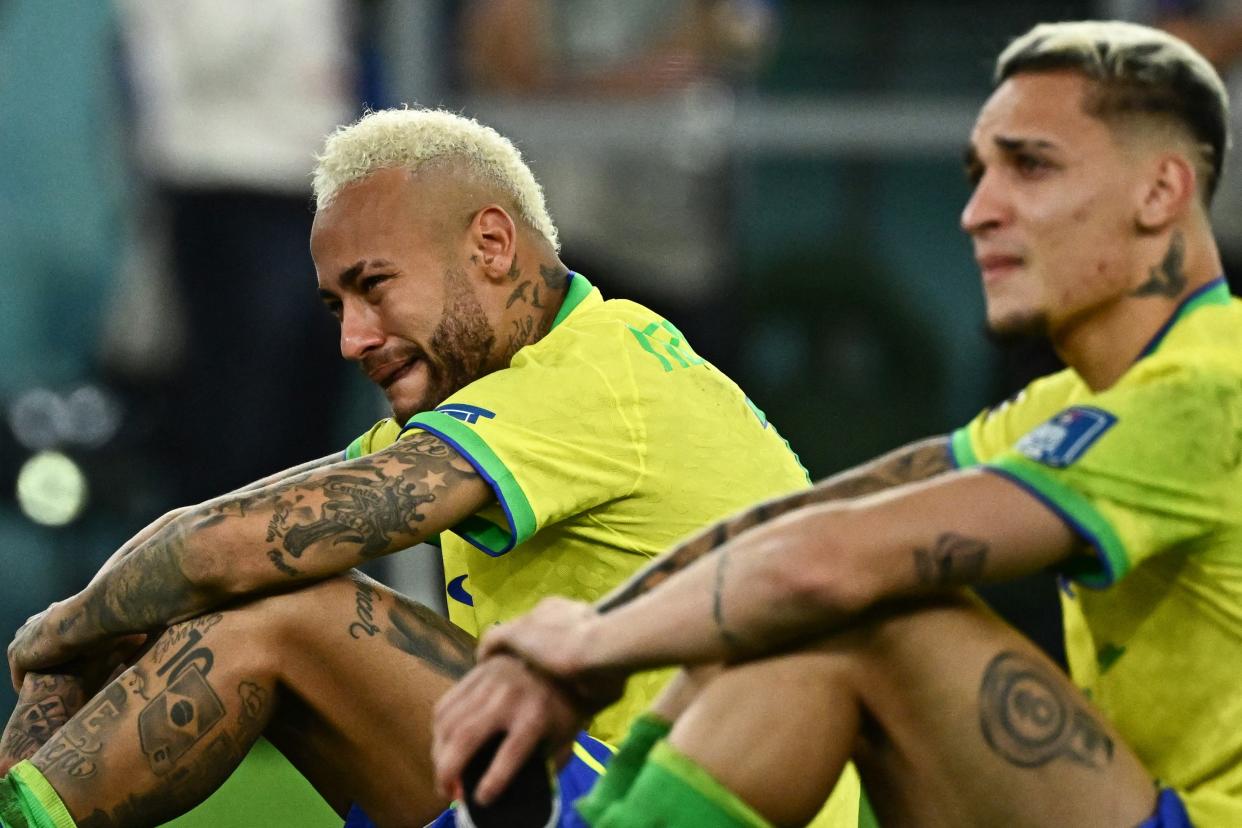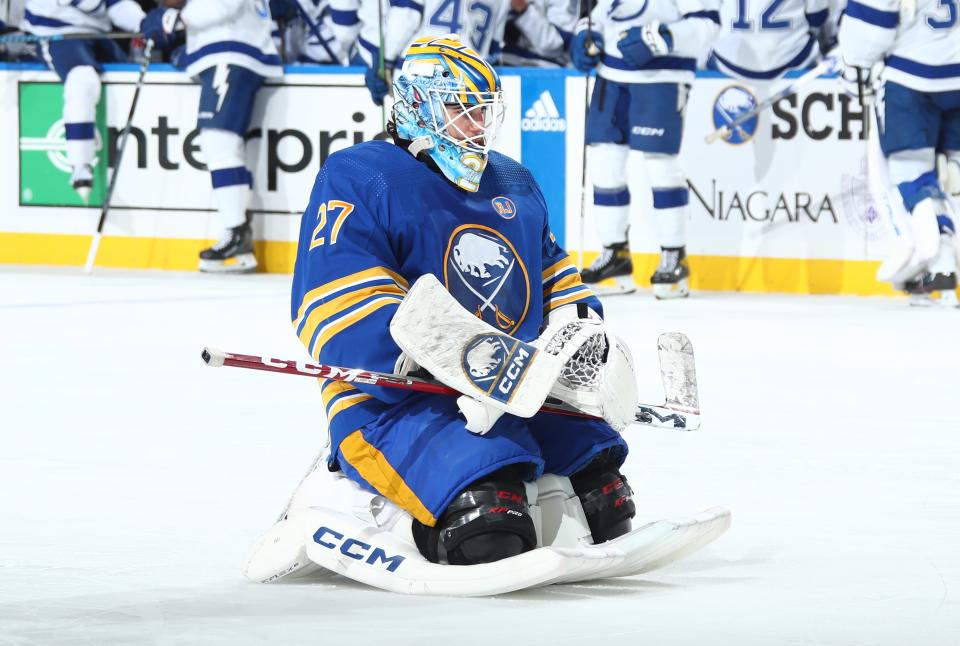There Is Crying in Baseball—and Every Other Sport, Too

- Oops!Something went wrong.Please try again later.
- Oops!Something went wrong.Please try again later.
- Oops!Something went wrong.Please try again later.
JEWEL SAMAD/Getty Images
Immediately after the Denver Nuggets won the 2023 NBA Championship, the first ever for the franchise, their star point guard, Jamal Murray broke down, crying. I was watching at home, without much invested in the game, but I started crying, too, simply in response to his open display of emotion. I watch a lot of sports, but don’t follow basketball closely, so it was news to me when, after the game, the interviewer said to him, “Two years ago, you were barely able to walk, but you vowed to come back…” I found out later, he’d torn his ACL, but, here, she was cut off by a roaring crowd, as Murrary broke down again, his eyes red—though this time he was smiling as his teammates patted him on the back and celebrated around him. It was like the ending of an inspirational movie.
It also felt like it was part of something bigger.
Not everyone is willing, or able, to be vulnerable in their day-to-day life. We can put up walls that allow us to function, but prevent us from accessing our own emotions. We might need an excuse to slow down and step outside of the usual workday to get to a place where we feel comfortable enough to let the emotions wash through, and, eventually, to cry. (I think it’s often what we’re looking for with yoga and edibles and other forms of “self-care.”)
We, of course, cry for different reasons. We cry at weddings because we’re happy (mostly). We cry at funerals because we’re sad (mostly). And, from the peewee to the college to the professional level, people cry (all the time) at sporting events. Sports might seem less serious than those other two things, but fandom can often last longer than a marriage, and people pass their love of a team down through the generations. When you add it all up, and count all the weddings and funerals against all the games I’ve watched, I’ve likely shed more tears at sporting events than anything else.
I don’t think I’m alone.
I know plenty of people whose main connection to a parent, or other family member, is their shared love of a team. It’s a space where people can show unbridled enthusiasm and sadness, often a few minutes apart. A sports event is the rare occurrence where you’re not judged for crying, whether it’s for a beer league in the park, a minor league baseball field, or the Olympics. It’s a space where people are given permission to show emotion. When, in the film A League Of Their Own, Tom Hanks said "There's no crying in baseball!," he was wrong. Strangers become familiar to one another, often through their shared emotion. Sports bring people together and they foster vulnerability.
Sporting events are also a place for contact on a macro scale. Sports cut across demographics and socio-economic status. It doesn’t matter who you are, or where you come from, if you love the same team. I wear a Buffalo Bills hat most days. I’ve been in different cities and countries and have had countless strangers say “Go Bills,” which I say in return, and we keep going. It’s a community based on a shared…I almost said “interest,” but it’s more of a shared passion or obsession.
But for everyone who wins, there’s someone who loses. And the tears flow just the same.
As mentioned, I’m a fan of the Buffalo Bills, and have, accordingly, cried a lot during and after their games. After their loss to the Kansas City Chiefs in the 2022 AFC title game, their star wide receiver, Stefon Diggs, didn’t leave the field; instead, he stood, by himself, and watched the victorious team celebrate. When asked later why he did it, he explained he was embracing the moment, and the feeling of losing. “I feel like I let my teammates down, and I just wanted more from myself from my moment, and to grow from it.” Diggs only left the field when his coach, Sean Mcdermott, walked up to him, put his arm on his shoulder, embraced him, gave him a few words, and they walked off together.
Moments like this remind us that our heroes are human. They allow us moments to see someone better at something than we are saying they wish they’d done better, or they never thought they’d be where they are, and that moment of humbling, in turns, offers a shared vulnerability. It’s almost like the players are reflecting back our own humanity and vulnerability, our own desire to be better at what we do.
My younger son Jake is 10. He’s an ice hockey goalie. He’s at the ice rink multiple times a week, deflecting pucks shot at him by other 9 and 10 year olds. Sunday mornings, we’re at the ice by 6am, and Jake’s locked in, as he is for his multiple weeknight practices, and his one-on-one goalie coaching sessions. Being a goalie is a big part of his identity.
It’s a stressful position. People tell him that goalies are a special type of player and then look at me with sad, nervous eyes. When he first said he wanted to play hockey, and that position specifically, we asked him over and over if he was sure—it’s a lot. He said he was.
Jake’s favorite hockey team is the Buffalo Sabres. The Sabres have a rookie goalie, a 21-year-old named Devon Levi. He’s already a phenom. Part of it is the way he carries himself. He seems much older than a kid just getting his bearings as a professional athlete. Part of it is because of his size: He was told he was too small to be a goalie. But, maybe the bigger thing so far, outside of his ridiculously good playing, is that during the TV timeouts at each game, Levi skates away from the goal, then turns back around, stops a few feet in front of it, gets on his knees, his hockey stick on his lap, and he meditates. He doesn’t move. He turns inward. And, so far, he never seems intimidated, even when confronted with a tense situation. Toward the end of last season, just a couple of games into his career, he faced his first overtime shootout, and calmly turned away the other team’s superstar player for the win.

Tampa Bay Lightning v Buffalo Sabres
Levi’s meditation practice feels vulnerable, but strong. Hockey, historically, is not a place where you see someone so still and calm on the rink—a guy with his head bowed, on his knees, in the middle of the ice, as fans sing along to “The Boys Are Back In Town” and folks skate around him, cleaning up the ice for the next part of the game. The first time I saw him do it, I cried.
I think someone like Levi is a great role model for younger athletes, and also for all of us. He’s incorporating moments of vulnerability into his work and life, despite the collective pressure to be tough and removed in a high-stakes environment. Vulnerability can be controlled or it can be a bit wild, but I do think we could all stand to incorporate it more into our daily lives.
I can see Jake seeing himself in Levi. He feels connected to this kind of approach. He’s already not scared of emotion, or admitting when he’s scared or sad or stressed. To see someone at the professional level in the same space confirms a lot for him, I think, and shows him he can be this sweet, nervous, funny, smart, weird kid—and also be an incredible hockey player. People are complicated. We always have been.
I’ve been thinking about crying more than ever because I just finished writing a book about it (and, frankly, the Bills have been having a pretty tough season). Both of my kids wrote something for the collection, which is called Sad Happens. Jake’s piece is about the moment he watched his beloved Bills lose to the Kansas City Chiefs in overtime and how, that night, he cried himself to sleep (and, he says, woke up crying still the next morning): “I cried when the Buffalo Bills lost to the Kansas City Chiefs because it was so FREAKING close and it’s like I got four numbers in the lottery but worse…”
At first, when he wrote it, he was a little nervous, but he said it was the first thing that came to mind when I asked him to recount a story about crying, so he did it anyway. When we got the first physical copies of the book in the mail, he proudly showed it to his friends.
Towards the end of last season, the meditating Sabres goalie, Devon Levi, was being interviewed after a game. The interviewer asked if he got nervous before he played—he said, yes, of course he did, he's human, but that he uses fear in a positive way, to lock himself into the moment. That's what's happening here, too, I think. Players and fans alike are afraid—there’s a lot to be scared of out there—and in this space, a stadium or field or rink, we’re not scared to admit that.
This honesty is where emotion comes from, I think. We see, through ourselves and others, that vulnerability—opening up and being real and letting go—has value. That’s the thing: Despite popular opinion that sports call for some kind of stoic superhero toughness, they’ve actually always been about being vulnerable, both as a player and a fan. They wouldn’t be appealing or compelling or so heartbreaking otherwise. I mean, after all, we’re all only (and extraordinarily) human.
Brandon Stosuy is the cofounder/editor in chief of The Creative Independent, and curates the annual Basilica SoundScape festival in Hudson, New York. This essay is adapted from the anthology Sad Happens: A Celebration Of Tears, published by Simon & Schuster.
Originally Appeared on GQ

